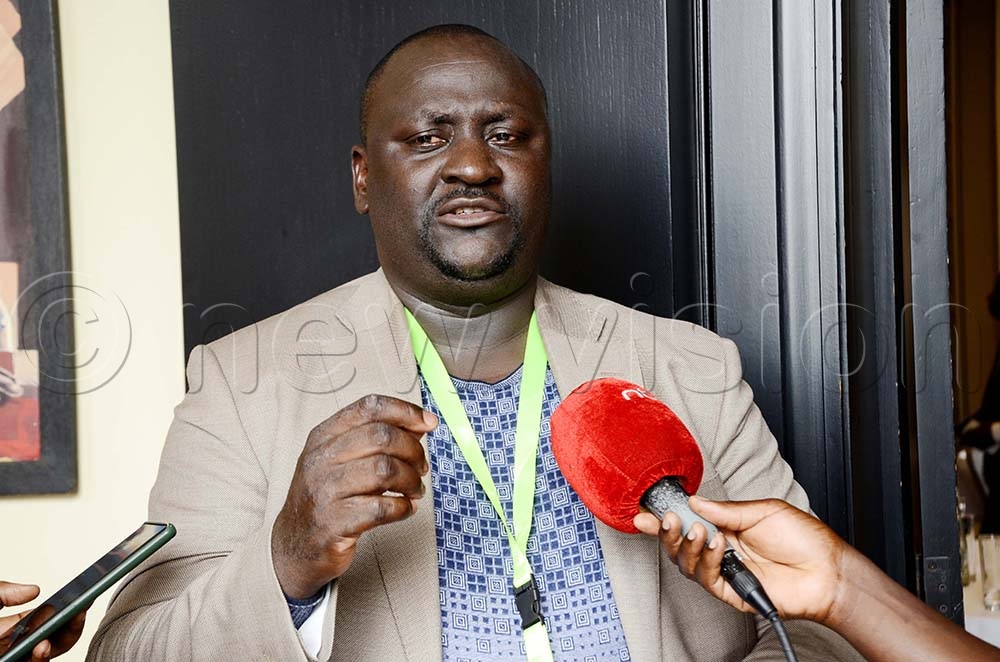Kadaga lauds Govt over new healthcare project for Busoga
“I want a time when people are told that if you want that specialised service, you will find it in Kamuli,” Kadaga said, adding that the government must now prioritise training and deployment of the personnel needed to operate advanced medical machines.
Rebecca Kadaga, First Deputy Prime Minister addressing delegates during the inauguration of the five–year initiative of the Smart Village Non-Communicable Diseases (NCD) Health Care Support Project at Mestil Hotel in Nsambya on October 24, 2025. (Credit: Juliet Kasirye)
Dr. Nelson Muzira Tenywa, the SADO country director, addressing journalists during the inauguration of the five–year Smart Village Non-Communicable Diseases (NCD) Health Care Support Project at Mestil Hotel in Nsambya on October 24, 2025. (Credit: Juliet Kasirye)
KAMPALA - First Deputy Prime Minister and Minister for East African Affairs, Rebecca Kadaga, has applauded the launch of the Smart Village Non-Communicable Diseases (NCD) Health Care Support Project, saying it will greatly improve access to specialised medical services in the Busoga sub–region.
Speaking during the inauguration of the five–year initiative at Mestil Hotel in Nsambya on October 24, Kadaga said the project will reduce the financial and emotional burden on families who have long travelled to Kampala to seek diagnostic services.
She noted that many patients in Busoga spend months waiting for scans and tests, yet most of the conditions could be detected and managed at regional health facilities if equipment and expertise were available.
“I want a time when people are told that if you want that specialised service, you will find it in Kamuli,” Kadaga said, adding that the government must now prioritise training and deployment of the personnel needed to operate advanced medical machines.
The project, a partnership between the Ministry of Health and the Smart Village Development Consortium (SADO), will run from 2025 to 2030 with an estimated investment of sh72 billion ($20.7 million).
It aims to strengthen NCD prevention, screening, diagnosis and treatment through modern diagnostic infrastructure and community outreach.
Five diagnostic centres for Busoga
The initiative will establish five major diagnostic centres equipped with state–of–the–art medical imaging technology, including MRI, CT scan, X-ray, ultrasound, mammography and endoscopy machines.
The centres will be located at Kamuli General Hospital – the flagship Centre of Excellence, Jinja Regional Referral Hospital, Iganga General Hospital, Bugiri General Hospital and Mayuge Health Centre IV.
These centres will support early detection and management of diseases such as cancer, hypertension, diabetes and heart disease, which remain the leading causes of death in the region.
Beyond the five hubs, the project will also install and commission modern laboratory and diagnostic equipment in 76 health facilities across the Busoga sub–region, covering lower-level health units that currently lack essential tools for NCD detection.
Busoga chosen as pilot due to high NCD burden
Dr. Nelson Muzira Tenywa, the SADO country director, said the sub–region was selected after studies showed it has the highest prevalence of NCDs in the country.
“We want NCD diagnosis to be part of daily health care service delivery. Many patients are misdiagnosed or discharged without proper screening,” he said, noting that the project will focus on improving both infrastructure and health worker capacity.
According to Dr. Muzira, the programme will also support a biomedical calibration and standards center at Wabigalo to ensure that machines across the country remain accurate and functional.
Community engagement, awareness campaigns, and integration of nutrition, child health and household income initiatives will form part of the wider response.
Construction is expected to begin in November, starting in Kamuli before rolling out to the other districts.
Ministry of Health pledges support
Representing the Ministry of Health, Dr. Alex Wasomoka, the assistant commissioner for hospitals and lower-level facilities, welcomed the partnership and said the ministry would work closely with suppliers and biomedical engineers to safeguard the equipment and ensure it is sustainably managed.
The technical team also revealed that designs for all centres have been completed, showing dedicated rooms for MRI, CT scan, X-ray, ultrasound, server rooms, laboratories and patient waiting areas.
Kadaga pushes for equitable distribution and manpower
While commending the partners, Kadaga challenged government planners to align training of specialists with the country’s growing health demands, questioning why many facilities lack essential professionals.
She also urged the Ministry of Health to decentralize training opportunities and called for increased attention to sickle cell disease, which she said remains highly prevalent in Busoga.
Kadaga added that she would brief the President on the project and ask him to attend the groundbreaking ceremony, saying the initiative “must be supported at the highest level if it is to succeed.”
A shift in regional healthcare
Once complete, the Smart Village NCD Health Care Support Project is expected to significantly reduce patient referrals to Kampala, cut diagnosis delays and improve survival rates for thousands of people living with non-communicable diseases.
The project partners say the Busoga pilot will later be replicated in other regions, beginning with Elgon, South–Western Uganda and Lango.
For Kadaga, the launch marks a long-awaited step toward equitable access to specialised care.
“We are working for the people of Uganda,” she said.